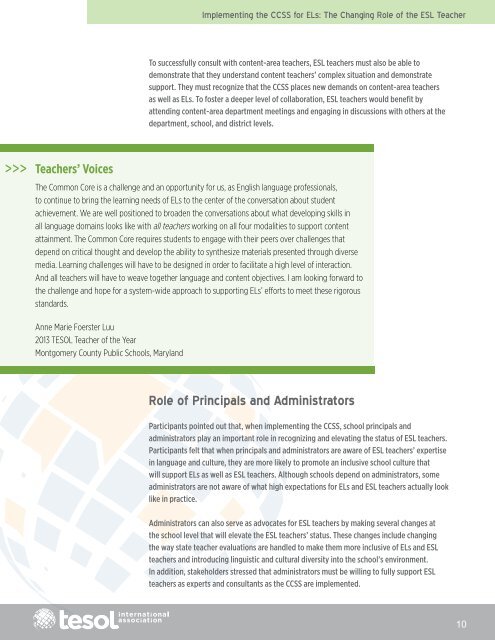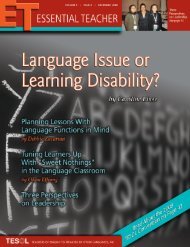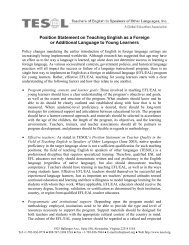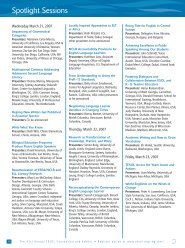Implementing the Common Core State Standards for ... - TESOL
Implementing the Common Core State Standards for ... - TESOL
Implementing the Common Core State Standards for ... - TESOL
You also want an ePaper? Increase the reach of your titles
YUMPU automatically turns print PDFs into web optimized ePapers that Google loves.
<strong>Implementing</strong> <strong>the</strong> CCSS <strong>for</strong> ELs: The Changing Role of <strong>the</strong> ESL Teacher<br />
To successfully consult with content-area teachers, ESL teachers must also be able to<br />
demonstrate that <strong>the</strong>y understand content teachers’ complex situation and demonstrate<br />
support. They must recognize that <strong>the</strong> CCSS places new demands on content-area teachers<br />
as well as ELs. To foster a deeper level of collaboration, ESL teachers would benefit by<br />
attending content-area department meetings and engaging in discussions with o<strong>the</strong>rs at <strong>the</strong><br />
department, school, and district levels.<br />
>>><br />
Teachers’ Voices<br />
The <strong>Common</strong> <strong>Core</strong> is a challenge and an opportunity <strong>for</strong> us, as English language professionals,<br />
to continue to bring <strong>the</strong> learning needs of ELs to <strong>the</strong> center of <strong>the</strong> conversation about student<br />
achievement. We are well positioned to broaden <strong>the</strong> conversations about what developing skills in<br />
all language domains looks like with all teachers working on all four modalities to support content<br />
attainment. The <strong>Common</strong> <strong>Core</strong> requires students to engage with <strong>the</strong>ir peers over challenges that<br />
depend on critical thought and develop <strong>the</strong> ability to syn<strong>the</strong>size materials presented through diverse<br />
media. Learning challenges will have to be designed in order to facilitate a high level of interaction.<br />
And all teachers will have to weave toge<strong>the</strong>r language and content objectives. I am looking <strong>for</strong>ward to<br />
<strong>the</strong> challenge and hope <strong>for</strong> a system-wide approach to supporting ELs’ ef<strong>for</strong>ts to meet <strong>the</strong>se rigorous<br />
standards.<br />
Anne Marie Foerster Luu<br />
2013 <strong>TESOL</strong> Teacher of <strong>the</strong> Year<br />
Montgomery County Public Schools, Maryland<br />
Role of Principals and Administrators<br />
Participants pointed out that, when implementing <strong>the</strong> CCSS, school principals and<br />
administrators play an important role in recognizing and elevating <strong>the</strong> status of ESL teachers.<br />
Participants felt that when principals and administrators are aware of ESL teachers’ expertise<br />
in language and culture, <strong>the</strong>y are more likely to promote an inclusive school culture that<br />
will support ELs as well as ESL teachers. Although schools depend on administrators, some<br />
administrators are not aware of what high expectations <strong>for</strong> ELs and ESL teachers actually look<br />
like in practice.<br />
Administrators can also serve as advocates <strong>for</strong> ESL teachers by making several changes at<br />
<strong>the</strong> school level that will elevate <strong>the</strong> ESL teachers’ status. These changes include changing<br />
<strong>the</strong> way state teacher evaluations are handled to make <strong>the</strong>m more inclusive of ELs and ESL<br />
teachers and introducing linguistic and cultural diversity into <strong>the</strong> school’s environment.<br />
In addition, stakeholders stressed that administrators must be willing to fully support ESL<br />
teachers as experts and consultants as <strong>the</strong> CCSS are implemented.<br />
10











